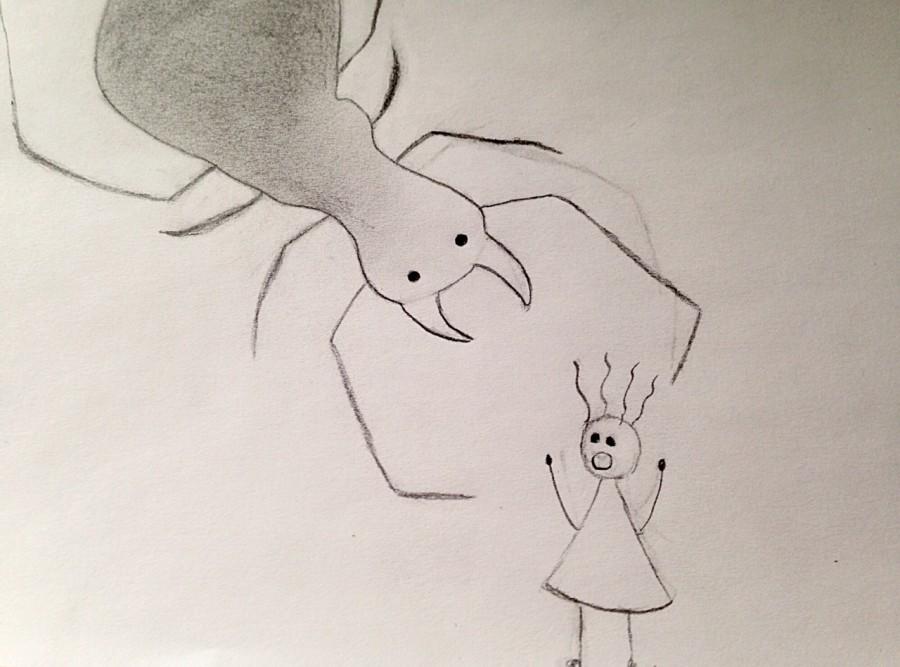The Terrors of Nightmares
The last few lines of Where the Wild Things Are echoed in her mind as five-year-old Ella Ruderman closed her eyes after she finished reading the bedtime story. Assuming she would be safe in her own subconscious, she drifted off to sleep, entering her imagination and leaving reality behind. In the early hours of the morning, terrorizing images emerged in her brain. The wild things came into her room, yanked Ruderman off her bed and threw her down the basement steps. She awoke abruptly with the conception prattling in her thoughts.
“I would have that nightmare every single night and I remember it so well,” said Ella Ruderman, a sophomore at Community High School. “I would always be thrown down my basement steps because I was scared of the basement at my old house.”
A nightmare is a disturbing dream associated with negative feelings, such as anxiety or fear, according to the website Mayo Clinic. Nightmares may begin in children between three and six years old and tend to decrease after about age 10. If stressed, it is more likely for a nightmare to occur because it leads to more brain activity in REM (Rapid eye movement) sleep.
There are two main stages of sleep: Non-REM sleep (NREM) and REM sleep. The body goes through about four to six cycles per night, and the REM stage becomes longer with each cycle. In NREM, there are three stages of sleep in which each is deeper than the last. By stage three, the body is in a deep sleep. The body is difficult to awaken, and if it is awakened, it does not adjust immediately and often feels groggy and disoriented for several minutes. Brain waves are extremely slow during this stage, and blood flow is directed away from the brain and towards the muscles, restoring physical energy, helpguide.org said.
Nightmares transpire during REM, or dream sleep, in the last third of a night’s sleep. REM sleep occurs about 70 to 90 minutes after falling asleep. The eyes move rapidly, breathing shallows, and the heart rate and blood pressure increase. Also during this stage, the arm and leg muscles are paralyzed, helpguide.org said.
In general, 85 percent of adults experience nightmares normally, according to the website Mental Floss. Eight to 29 percent of those people experience nightmares about once a month, and two to six percent of those people have nightmares once per week.
“I don’t get [nightmares] very often anymore, but when I do it’s because something is stressing me out or giving me anxiety and then I have them every night,” said Ella Mosher, a sophomore at Community High School.
Nightmares can be caused by many factors including the following: alcohol, drugs, certain medicines, lack of sleep, stress or trauma, according to “How to Cure Nightmares in Teenagers” by Tamara Runzel. There are also psychological triggers can cause nightmares. These include anxiety, depression and post-traumatic stress disorder (PTSD).
“For me, nightmares are mostly caused by any stress or worry, but it’s weird because they don’t usually relate to what I’m worried about,” Mosher said. “They just happen when there’s something bothering me.”
After experiencing a traumatizing nightmare, it’s normal to feel disturbed. It may be difficult to fall back to sleep because the illusion of the nightmare can be difficult to obliterate from the brain. “I feel pretty shaken up after a nightmare and sometimes it’s hard to get back to sleep,” said Josh Krauth-Harding, a sophomore at Community High School. “I usually get over it or forget about it completely by a half an hour later.”
“When I was little and I’d wake up from a nightmare and go immediately into my parents room, but now I’m able to shake it off pretty easily,” Mosher said. “The worst is when I keep falling back asleep into the nightmare, so I become scared to go back to bed.”
The brain is overloaded with thousands of bits of information everyday. The input of this information decreases during sleep, and the brain is able to sort out what has been successfully accomplished and what hasn’t been accomplished. The unresolved issues in the subconscious of the mind can factor into having a nightmare or not. “I think nightmares are caused by insecurities you’re thinking about, what mood you’re in or experiences that happen right before you fall asleep,” Krauth-Harding said.
“Once I had this nightmare where I was walking downtown with my mom and somehow we were walking in the street and a car ran her over. She got up and her scalp and her hair were coming off,” Ruderman said. “It was really gruesome and it was probably because I watch lots of medical TV shows. That was one of my worst nightmares because I was so freaked out.”
“My most frightening nightmare was where I ‘woke up’ and my room was completely covered in spiders of all different shapes and sizes,” Mosher said. “Then, all of a sudden, the bodies became lifeless and the legs fell off and all of the bodies joined together into one giant spider and it crawled up on my bed, and then I woke up.”
There are many ways to treat nightmares if they become an excessive problem. Exercising regularly and eating less sugary foods before bed can help mitigate nightmares caused by anxiety or stress. If nightmares only occur occasionally, then it is not considered a dilemma; it’s ordinary and nothing to worry about. “A lot of the time, I forget about them,” Mosher said. “If it’s a really bad nightmare I’ll tell my friends, but it’s not usually something that haunts me.”
Sources:
http://www.mayoclinic.org/diseases-conditions/nightmare-disorder/basics/definition/con-20032202
http://mentalfloss.com/article/52228/what-causes-nightmares
http://www.helpguide.org/articles/sleep/how-much-sleep-do-you-need.htm
http://everydaylife.globalpost.com/cure-nightmares-teenagers-9713.html




